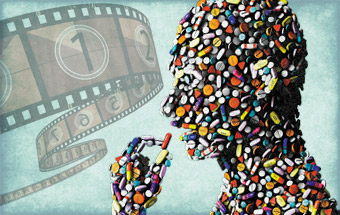The Film That Will Change the Face of Health Care
Coming to a theater near you: the truth about the medical / drug monopoly and a chance to reshape our health care priorities.
By Peter W. Crownfield
How enthusiastic is Jeff Hays, executive producer of the much-anticipated health care documentary originally titled "Medical, Inc." (recently retitled "Doctored") about his soon-to-be-released film? According to Hays, he's more proud of this documentary than any other film he's done.
Exciting words from the man with "On Native Soil" and "Farenhype 9/11," among other works, to his credit. With "Doctored" now in its final cuts and the curtains about to be lifted, what better time to catch up with Hays in this exclusive interview?
Hays shares what he learned in making the film, what he hopes the audience will learn, and his thoughts on a medically dominated health care system where "drugs and surgery first, chiropractic last" is in desperate need of a priority reversal. The goal of the documentary, according to Hays: encourage the public to take charge of their health and consider alternatives to the traditional medical model – starting with chiropractic care.
Now that you've completed the documentary, what can you tell us about the final product, both in terms of what you've learned during the process and what you hope the viewer will learn? On a personal level, what I didn't know (and what I hope we can communicate to viewers) is that chiropractors have a philosophy of health that is uniquely needed today. We have just completely given ourselves over to the drug model, to the point that it's not even questioned; it's what you do.
 I always assumed chiropractors didn't prescribe drugs because they couldn't. I had no idea there might be something philosophically of value as to why they shouldn't. I was put on blood pressure medication 20 years ago and never skipped a day. It wasn't until I started this project that someone said to me, "Have you ever looked at why your body has high blood pressure?" Literally the thought had never occurred to me in 20 years. I just want to get chiropractors a seat at the table ... and I think we've really done that.
I always assumed chiropractors didn't prescribe drugs because they couldn't. I had no idea there might be something philosophically of value as to why they shouldn't. I was put on blood pressure medication 20 years ago and never skipped a day. It wasn't until I started this project that someone said to me, "Have you ever looked at why your body has high blood pressure?" Literally the thought had never occurred to me in 20 years. I just want to get chiropractors a seat at the table ... and I think we've really done that.
What is the primary focus / theme of the documentary – exposing the medical "monopoly" over health care, highlighting the dangers of drugs, emphasizing the value of chiropractic and drug-free options, or something else? The fundamental theme is that you have to be in charge of your own health – even if you don't want to. We followed several patients, one of whom has MS. He's 54 years old, he's the healthiest-looking guy you'll ever meet, and what you learn is that if you have a chronic disease, you can have a healthy body or an unhealthy body. Just because he has MS doesn't mean he isn't going to die of a heart attack, disease, stroke or cancer. You still have to take care of yourself, and in his case, even more so.
So, once you decide you have to take care of yourself, the question becomes, OK, how do I do that? One of the players on the field [chiropractic] has been cheated, and one [traditional medicine] has propelled itself to the top of the pile by cheating. And that's the drug-centered model of health that doesn't make anybody healthier.
That's where the story comes in – Is there a way of being healthier? Why isn't it more popular? Why don't we know more about it? It's because the deck has been stacked and people have cheated. And that's everything traditional medicine has done to extinguish this branch of medicine, of health, called chiropractic.
The way it's presented in the film is to consider chiropractic first, drugs second, surgery third. What happens with most people is drugs first, surgery second and if everything fails, then I might go to the chiropractor. [We need to get] chiropractic as a consideration that, as you examine the potential damage drugs and surgery do, it's a rational thought from a conservative standpoint: Why not try chiropractic first? There's so little to lose.

